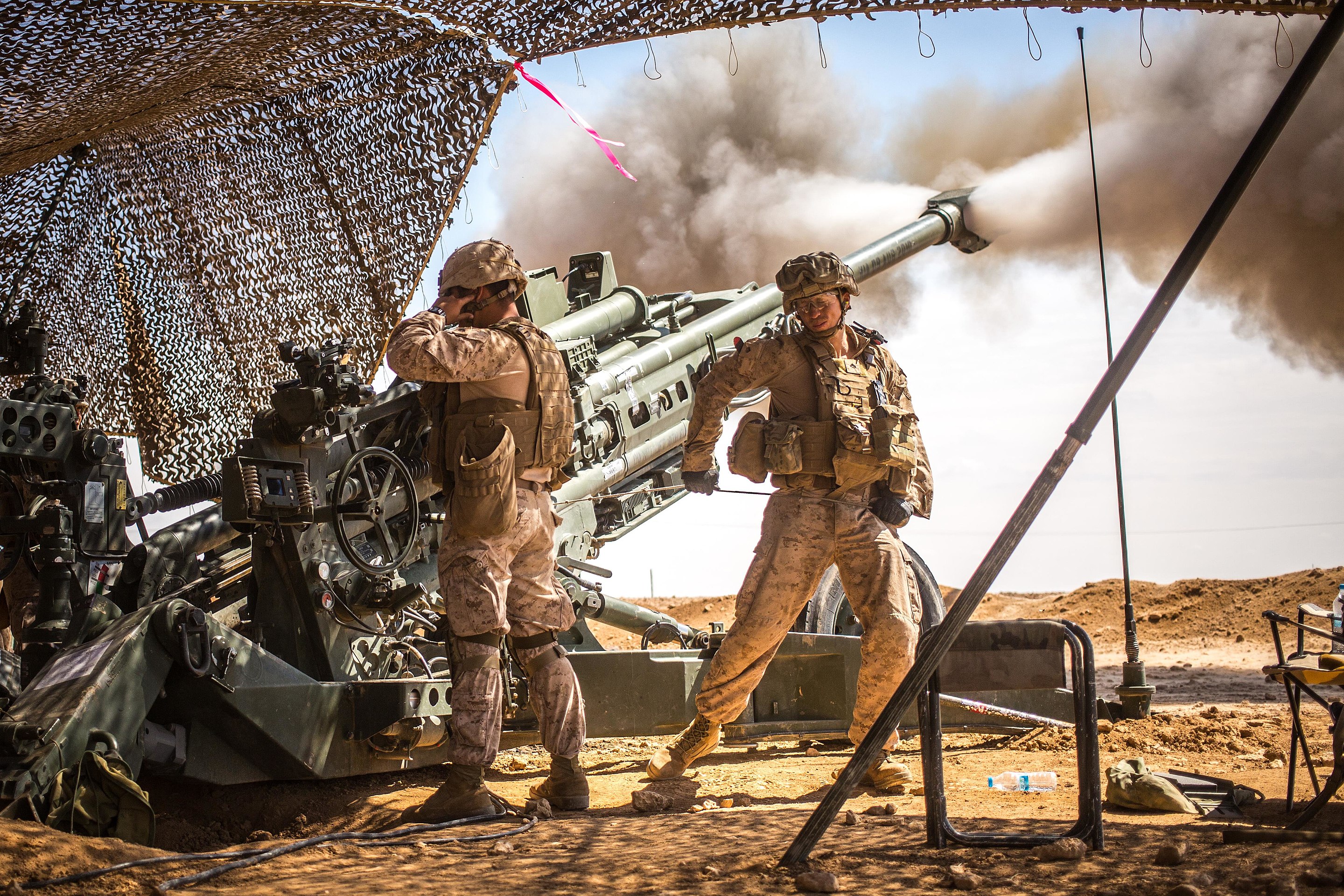by Gordon Adams
It’s manhood time again. In 2013, then-President Barack Obama stepped back from an airstrike in Syria. Five years later, Donald Trump decided that U.S. troops were done in Syria and should come home. And the foreign policy blob in DC has erupted in every direction.
Obama’s decision was treated with derision. Consistent with the long-standing American tradition of toughness expressed through military intervention, critics charged that he had chickened out and, in so doing, undermined American credibility. Obama had no political support for the strike either in the UK or in DC. In the end, the goal—the removal of Syria’s chemical weapons stocks—was achieved without an airstrike. Nobody actually knew what the next step into the Syrian quagmire would be after such a strike. But in the end, those facts were ignored—Obama had failed the manhood test.
Now we’ve come to round two. The idiosyncratic, unpredictable, un-strategic Donald Trump has decided that U.S. troops in Syria should come home now, not later. Liberal and conservative interventionists and neoconservative hegemonists are collapsing on the President. Once again, they see this as a failure of manhood. American “leadership” is at stake, and our international credibility has been devastated.
The Trump announcement, though badly handled, is the right thing to do. Arguably, the U.S. should never have deployed troops to Syria. No vital American national interest was ever at stake in the outcome. What happens in Syria is far more vital to Turkey, next door; to Russia, with its long-standing strategic presence on the country; to Iraq, seeking a more stable and less violent neighbor; to Bashir al-Assad, whose regime survival depended on military action; to the Islamic State (ISIS or IS), which hoped to establish a caliphate based in eastern Syria; and to Iran, whose influence in the region continues to grow.
U.S. troops made and continue to make almost no difference in Syria. They did not deter Turkey from intervention, nor would they deter Turkey from striking at the Kurds. The U.S. troops were inconsequential to the Russians, who had a bigger stake in a military intervention and carried it out, undeterred by Washington. U.S. forces never played a role in the outcome of the civil war, now virtually won by Bashar al-Assad with Russian and Iranian help. They played no role in deterring the Iranians from supporting Assad and extending Iranian influence. Arguably, only in arming, training and supporting the Kurds against IS did U.S. forces matter.
Leaving those forces in Syria will buy the U.S. no new influence unless the Trump administration is prepared to enter the civil war, a quagmire the U.S. has wisely avoided. The U.S. was never a major party in the war, and unless we are prepared to confront Assad or the Russians we will not be invited to any negotiating tables. The withdrawal is unlikely to open the door to an IS resurgence—none of the other parties to the conflict has an interest in such a resurgence, including Assad. Unless the U.S. is prepared to deploy forces along the Turkish border as a tripwire, there is little prospect they could prevent a Turkish attack on the Kurds. The Iranians are not affected by the U.S. military presence.
So we’re back to manhood. The U.S. should stay in Syria, because, well, because it should stay in Syria.
It is seriously time to welcome the role of restraint in a successful foreign policy. Trump is not bringing in restraint. After all, he uselessly fired missiles into Syria in 2017 and again in 2018, asserting his own manhood. He withdrew from the Iran nuclear agreement, unsettling the region, upsetting allies, and increasingly leaving the use of force as the only option the U.S. has to deal with Iran. He has sided with Israeli Prime Minister Benjamin Netanyahu against the Palestinians (possibly with Saudi collusion), leaving those long-suffering people with no options but starvation or violence. He has sided with the Saudis, arming and supporting their disastrous conflict decimating and starving the Yemeni people, and further exacerbating the risks of military confrontation with Iran.
There is no Trump strategy here. Even the troop withdrawal from Syria was more an impulse than a strategy. Maybe what emerged looks like restraint, but a lot of implementation mistakes were made in the process. Trump failed to prepare the ground for such a decision in advance. He failed to coordinate within his own administration, leaving the Pentagon, State Department, and National Security Council hanging out to dry. He failed to make the move clear well in advance to allies so they would not be surprised. He failed to have a discussion with the Turks about their intentions vis-à-vis the Kurds.
Planning and implementation are not the strong points of this Administration. On the other hand, given the resistance of the foreign policy “blob” to one scintilla of greater restraint in U.S. policy toward the Middle East, perhaps a one-person decision over the protests of his advisors was the only way Trump could shift the dialogue.
The truth is that U.S. leverage in the Middle East has been eroding for some time. Not because this country failed some “manhood” test, but simply because power in the region has been shifting and the U.S. is no longer “indispensable.” Wisely or stupidly, the Turks are playing a more independent role, the Saudis have had a regional policy of intervention and religious extremism for decades, the Iranians are determined to play a greater regional role, and the Russians will play a role undeterred by the U.S.
A strategic re-evaluation of the U.S. regional role is badly needed, one that sweeps away the voices of neoconservative hegemony and both liberal and conservative interventionism. Sadly, with the blob erupting all across DC and in the media, the voices for such a re-evaluation are not yet finding an outlet. Repeated assertions of “indispensability” from the foreign policy and military establishment will continue to draw the U.S. into quagmires.
This troop withdrawal may hold the promise of an opening in the foreign policy discourse, with a more realistic and more restrained option for American engagement on the table at last. Setting aside the notion of “manhood” as the centerpiece of U.S. foreign policy would be a step forward.






I agree with the author that his the Syrian war, as tragic as it is, is not our problem. There is little to be gained by the US here. The Turks as much more important allies than the Kurds. The challenge as usual is that many people are making too much money in the US staying in Syria and these are the people up in arms. Even better decision is to get out of Afghanistan. Our fight was never with the Taliban, it was the Al-Qaeda who is largely destroyed. Spent the $7Trillion on US roads, education, homeless, health, etc. Let China and Russia now worry about their Moslem populations and their radicalization by spending money.
Very good article! A few weeks ago the generals in the field raised their voices to their commanders that their people are sitting ducks in northern Syria with no clear objectives! At the same time the trio being Russia, Turkey and Iran made an announcement that the US ought to pull its forces out of Syria since there’s no ISIS and no excuse for staying there!
The axis of destruction in the ME, the US, Saudi Arabia and Israel, created ISIS and the other trio decimated them. Trump’s announcement of pulling the 2000 personnel Force out of Syria was a natural and inevitable action. The noise in DC is all about the US forces not being there on the ground to protect Israel in an unforeseen event!
May be there’s a light at the end of the ME tunnel!
General Matis like a coward he is he opt out to share the blame for failure of his policy recommendations on Syria. It was easy for him to toss the blame on Trump and resign in protest once the mission was clearly a failure. Sure you wouldn’t hear this version in MSM, he resigned in protest to blame trump for his and Obama’s decision to illegally invade a sovereign UN member state.
The tumultuous response to Trump decision is clearly coming from the neocon mafia that thought it was controlling Trump on order to protect Israel. Despite the neocon successes in isolating economically Iran, Israel is extremely worried to see Russia protecting Syria, Iraq becoming closer to Iran ,Saudi Arabia in crisis , Turkey siding with the Palestinian and Hezbollah stronger than ever. The USA withdrawal from Syria is a new catastrophe for the Zionist lobby and Israel. No wonder the msm became hysterical. Mattis was called Mad Dog mattis, he was a warmonger and bad planner. Good riddance. For once Trump has shown that he is not the puppet of the neocons and israel. Will they make him pay for that sign of Independence?
I question the term “Civil War”. From its inception to its dying days is has been foreign agression in a Sovereign state funded and abetted by the US, UK and Isreal. From the “coalition” air strikes, to the countless brands of jihadists to UK financed and engineered “White Helmets” it is far from an internal uprising.
It’s ironic that our master bully has the courage to say, “no more” to the deep state. Whereas his predecessor even with his Nobel Peace Prize credentials could only respond with a “yes sir” and spread more and more war and chaos.
Well done Mr. Trump, keep this ball rolling.